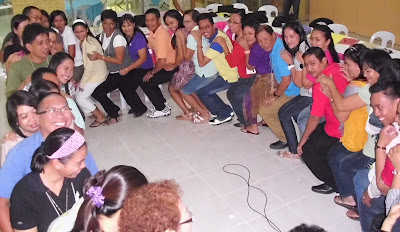Friday, December 31, 2010
New Year Greetings 2011
Friday, December 24, 2010
AWCF attends multi-event affair in Ligas
AWCF-SCC project holds first monitoring forum



More on it@coops shared in Berlin

Philippine co-op leaders visit Vietnam



Gender experts build capacity in AWCF-SCC workshop




AWCF shares its FK project learning in Singapore


AWCF joins FK activities: Phase 3 of project underway


Tuesday, October 26, 2010
it@coops in the Philippines (video)--Part 2
it@coops in the Philippines (video)--Part 1
it@coops Thailand--a video
Empowering Co-operatives through Information Technology (Part 2)
(Part 2 of a two-part video) In 2004-2007, AWCF and InWent (Capacity Building International, Germany) implemented the Project "it@coops" (Information Technology for Southeast Asian Co-operatives). The Project was supported by the Federal Ministry for Economic Cooperation and Development (BMZ), Germany. Participating organizations were the Credit Union League of Thailand (CULT), Thailand; Forum for Indonesian Co-operatives Movement (FORMASI Indonesia), Indonesia; and National Confederation of Cooperatives (NATCCO), Philippines. The Project's overall objective was to provide poverty-oriented co-ops in Southeast Asia with skills in, understanding of, and access to IT that will make them more competitive. The it@coops Project also aimed at transforming the new IT forms into popular and gender-accountable instruments to help co-ops pursue their social and economic goals amid the challenges of globalization.
Empowering Co-operatives through Information Technology (Part 1)
In 2004-2007, AWCF and InWent (Capacity Building International, Germany) implemented the Project "it@coops" (Information Technology for Southeast Asian Co-operatives). The Project was supported by the Federal Ministry for Economic Cooperation and Development (BMZ), Germany. Participating organizations were the Credit Union League of Thailand (CULT), Thailand; Forum for Indonesian Co-operatives Movement (FORMASI Indonesia), Indonesia; and National Confederation of Cooperatives (NATCCO), Philippines. The Project's overall objective was to provide poverty-oriented co-ops in Southeast Asia with skills in, understanding of, and access to IT that will make them more competitive. The it@coops Project also aimed at transforming the new IT forms into popular and gender-accountable instruments to help co-ops pursue their social and economic goals amid the challenges of globalization.
Monday, October 4, 2010
AWCF-FK project has third batch
Thursday, September 9, 2010
AWCF starts gender equality project with SCC
AWCF has officially launched the three-year Swedish Cooperative Centre (SCC)-funded “Promoting Gender Equality (GE) Among Co-operatives in the Philippines” Project with three recent orientation meetings in 2010 attended by key leaders and managers of the 15 participating Philippine co-op organizations.The main objective of the meetings was to introduce this Project, which would involve strategic interventions related to four components: human resource capacity-building; strengthening of plans, systems, and structures; research and policy advocacy; and capacity-building on project planning, monitoring, and evaluation. At the meetings, AWCF was able to obtain from the stakeholders their commitment to implement the Project with the signing of the Memorandum of Understanding (MOU). Also discussed at the meetings were the GE Survey required from the co-ops and the June-September 2010 schedules for the gender-sensitivity training for leaders and staff to be conducted in each of the organizations.
The first orientation meeting was held in Davao City, Philippines, April 8, which was attended by the Mindanao State University–Iligan Institute of Technology (MSU-IIT) Multipurpose Coop; Paglaum Multipurpose Co-op; Panabo Multipurpose Co-op; Pantukan Chess Club Co-op; and Tagum Co-op.The second orientation meeting was in Cebu City, April 20, attended by the Bosconian Multipurpose Co-op; Cordova Multipurpose Co-op; Dumanjug Multipurpose Co-op; Lamac Multipurpose Co-op; and Metro Ormoc Community Co-op. The third orientation meeting was in Quezon City on April 22, with attendees from Abra Diocesan Teachers and Employees Multipurpose Co-op; Ligas Kilusang Bayan sa Pagpapaunlad; Nueva Segovia Consortium of Co-ops; St. Martin of Tours Credit and Development Co-op; and Sacred Heart Credit Development Co-op.
The GE Project is part of SCC’s country programme for 2010-2012, which is the “Advancing Civic Capacities for Effective and Sustainable Services to the Poor (ACCESS to the Poor)" Programme with funding support from the Swedish International Development Cooperation Agency (SIDA).
Tuesday, August 3, 2010
“Equal rights, equal opportunities: Progress for all”--message from the ICA

Friday, July 16, 2010
The Impossible Dream--UN film on women's multiple burden
Tuesday, July 13, 2010
AWCF 5th GA: Improved Direction, New Member and Officers
 In her report to the assembly, AWCF Chairperson Ms Kruewan Chonlanai of CULT highlighted AWCF’s activities and outputs, and learning and insights gained, for the period August 2007-June 2010. AWCF Treasurer Dr. Bui Quan Toan of CAEV also presented to the GA the comparative financial performance report of AWCF from 2007-2009. In her Secretariat’s report, AWCF Executive Director Ms Salome Ganibe updated the GA on AWCF activities in January-May 2010, such as on the organization’s projects with the Swedish Co-operative Center (SCC)—“Promoting Gender Equality Among Co-operatives in the Philippines”; MISEREOR—“Poverty Reduction and Empowerment of Women through Enterprise Development in CVL Countries”; and Fredskorpset-Norway—“Capacity-building for Gender and Co-operatives in Asia.”
In her report to the assembly, AWCF Chairperson Ms Kruewan Chonlanai of CULT highlighted AWCF’s activities and outputs, and learning and insights gained, for the period August 2007-June 2010. AWCF Treasurer Dr. Bui Quan Toan of CAEV also presented to the GA the comparative financial performance report of AWCF from 2007-2009. In her Secretariat’s report, AWCF Executive Director Ms Salome Ganibe updated the GA on AWCF activities in January-May 2010, such as on the organization’s projects with the Swedish Co-operative Center (SCC)—“Promoting Gender Equality Among Co-operatives in the Philippines”; MISEREOR—“Poverty Reduction and Empowerment of Women through Enterprise Development in CVL Countries”; and Fredskorpset-Norway—“Capacity-building for Gender and Co-operatives in Asia.”




